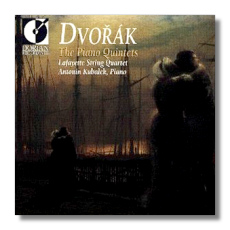
The Internet's Premier Classical Music Source
Related Links
- Dvořák Reviews
- Latest Reviews
- More Reviews
-
By Composer
-
Collections
DVD & Blu-ray
Books
Concert Reviews
Articles/Interviews
Software
Audio
Search Amazon
Recommended Links
Site News
 CD Review
CD Review
Antonín Dvořák

Piano Quintets
- Quintet for Piano and Strings in A Major, Op. 5 (1872)
- Quintet for Piano and Strings in A Major, Op. 81 (1887)
Antonín Kubalek, piano
Lafayette String Quartet
(Ann Elliott-Goldschmid, Sharon Stanis, violins;
Joanna Hood, viola; Pamela Highbaugh Aloni, cello)
Dorian DOR-90221 DDD 67:51
It's hard to imagine anyone not liking Dvořák's Op. 81 piano quintet; if such a person exists, I'm not sure I want to meet him or her. The first movement alternates between heart-melting song and heroic drama, and the "Dumka" second movement is a series of tender, regretful melodies - the very sound of nostalgia. The third and fourth movements are filled with dance, swirling colors, and the see-saw alternation between major and minor keys that can make this composer's music so emotionally ambiguous, even when it's at its most outgoing.
There are many favorite recordings of this quintet. I've taken Rubinstein/Guarneri (RCA), Schnabel/ProArte (Arabesque), and Firkušný/Juilliard (Sony) down from the shelves in the past month. These recordings deserve the acclaim they've received over the decades, but I can't say that I enjoyed Kubalek/Lafayette less than any of them. First of all, there's an unusual feeling of dialogue between the pianist and the quartet. I'm tempted to say that the differences in age and gender (youngish, all-female string quartet meets older, male pianist) are playing in a role in the bidirectionality of these readings, but perhaps that's facile. At any rate, it's clear that the musicians are listening to each other, matching their phrasing and tone, and spurring each other on. The other reason I like this performance as much as I like the starrier, smoother-played alternatives is that it is more friendly, intimate, and, in the first two movements, elegiac. The other ensembles I mentioned broadcast Dvořák's big moments to the world; Kubalek and the Lafayettes keep the "chamber" in "chamber music."
The three-movement Op. 5 quintet will never be as popular as Op. 81. Dvořák sweated over it, revised it, cut it, and still wasn't satisfied with it, but we don't have to be as critical as the composer was. It's true that it's not a star of the first magnitude, but it still shines. The second movement, like Op. 81's "Dumka," is almost painfully sad, but the earlier work's sadness is less nostalgic and more noble. Richter/Borodin (who also recorded a great Op. 81), Panenka/Smetana, and Firkušný/Ridge are the only alternatives I see listed in Opus. I've only heard the first of the three, but I have the feeling that Kubalek/Lafayette can hold their own here too.
Kevin Bazzana's program notes are uncommonly detailed, and so is Dorian's recording. The sound is so warm, you'll want to take a bath in it.
Copyright © 1996, Raymond Tuttle

















